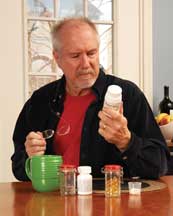|
|
|||
| Reader Beware: Misleading reports in the media open the door for DSHEA's destruction--but don't be fooled by the hype!
|
|
||
|
FREE! Natural Weight Loss
Program recommended by The Share Guide
|
DSHEA, the Dietary Supplement Health and Education Act of 1994, preserved our right to take safe nutritional supplements by classifying them as foods. With this classification, DSHEA ensured that nutritional supplements remained abundant and affordable, thereby helping Americans to achieve good health naturally. This past September, the front cover of Consumer Reports featured the following headline: "The 12 Most Dangerous Supplements: Which Ones to Avoid and Why They're on the Market." With this sensationalist article, Consumer Reports perpetuates the mainstream media's habit of falsely representing supplements as ineffective, dangerous or even deadly. What is the link among all these stories, including the latest one in Consumer Reports? Questionable reporting that appears to distort the truth and is meant to turn readers away from natural nutrition. What is Coltsfoot? So if Consumer Reports is publicizing a dire headline warning of "dangerous" supplements, then those supplements must be highly relevant to the magazine's 7.3 million subscribers--right? Guess again. The items flagged in the report include aconite, bitter orange, chaparral, coltsfoot, comfrey, country mallow, germanium, greater celandine, kava, lobella and yohimbe. These are hardly mainstream supplements. Whoever is behind the article appears to have picked obscure ingredients and presented them as representative of the entire dietary supplement industry. But in reality, many of the ingredients mentioned in the Consumer Reports article may have never been sold as supplements or have been off the market for years. An editorial published in USA Today later suggested that when their sales are combined, the 12 supplements Consumer Reports mentions account for less than 1% of the total nutritional supplement sales in the US--and that estimate may be generous. What's puzzling is that the very same Consumer Reports issue had an article about the millions of people who benefit from supplements. Why then would the cover be dominated with a headline about "dangerous" supplements that represent less than 1% of supplement sales? DSHEA Barb What's more, Consumer Reports seems to leverage its "dangerous supplements" article to bash the Dietary Supplement Health and Education Act, stating: "The Food and Drug Administration has not made full use of even the meager authority granted it by the industry-friendly 1994 Dietary Supplement Health and Education Act (DSHEA)…As a result, the supplement marketplace is not as safe as it should be." This quote seems to suggest that DSHEA equals dangerous supplements while the FDA equals safety. Don't fall for the hype. DSHEA has preserved our right to take supplements by classifying them as foods. It was designed to enable Americans to achieve good health by making supplements abundant and affordable. Meanwhile, the FDA hardly seems capable of protecting us from purported "dangerous" supplements; the synthetic drugs it approves are linked to over 100,000 deaths and millions of injuries every year! And so the pattern continues. Health freedom's enemies hand-pick isolated adverse events, questionable studies and obsolete ingredients--and use them to condemn the entire natural products industry. Even more disturbing is that regardless of the approach, these attacks always seem to have the same goal: the destruction of DSHEA. Don't believe everything you read. Exercise health freedom by thinking independently, making wise nutrition choices and purchasing supplements from quality manufacturers. The enemies of health freedom want to make your decisions for you. To determine your own health destiny you must actively defend DSHEA, which keeps supplements available and affordable. And, thanks to health freedom, your safety and vitality are largely up to you and the choices you make--not the choices Big Brother wants to make for you. What You Can Do The Nutritional Health Alliance is one of the most active political organizations in the nutritional health community, founded in 1992 in Santa Ynez, California. Organized by consumers, health care professionals, retailers, distributors, supplement manufacturers, mail order and multilevel marketing firms, and industry trade and consumer publications, the NHA became the much-needed umbrella organization to bring together the various constituents of the natural products industry in a single, powerful voice that would be heard by Washington policymakers and regulators. To support health freedom, visit www.nha2010.com and join the Nutritional Health Alliance today. Let your voice be heard: write to your Congressperson to keep your right to buy vitamins in your own hands. Don't let Congress and the FDA take your vitamins away! This article is a public service announcement sponsored by the Nutritional Health Alliance (NHA). Reprinted with permission from Energy Times, October 2010. Visit www.energytimes.com Related Info: Natural Alternatives to Antibiotics Reduce the Effects of Aging with Natural Supplements Cool Inflammation: Say No to NSAIDS Whole Food Supplements Mushrooms: Ancient Allies for Modern Medicine Medicinal Mushrooms: Nature's Abundant Pharmacy Medicinal Mushrooms: Immune Health & More Should You Give Your Pet SUPPLEMENTS? Natural Weight Loss Program recommended by The Share Guide: learn more MORE
HEALTH ARTICLES  Follow us on Facebook Follow us on FacebookHome Shop |
||
|
|
|||
|
|
|
||

